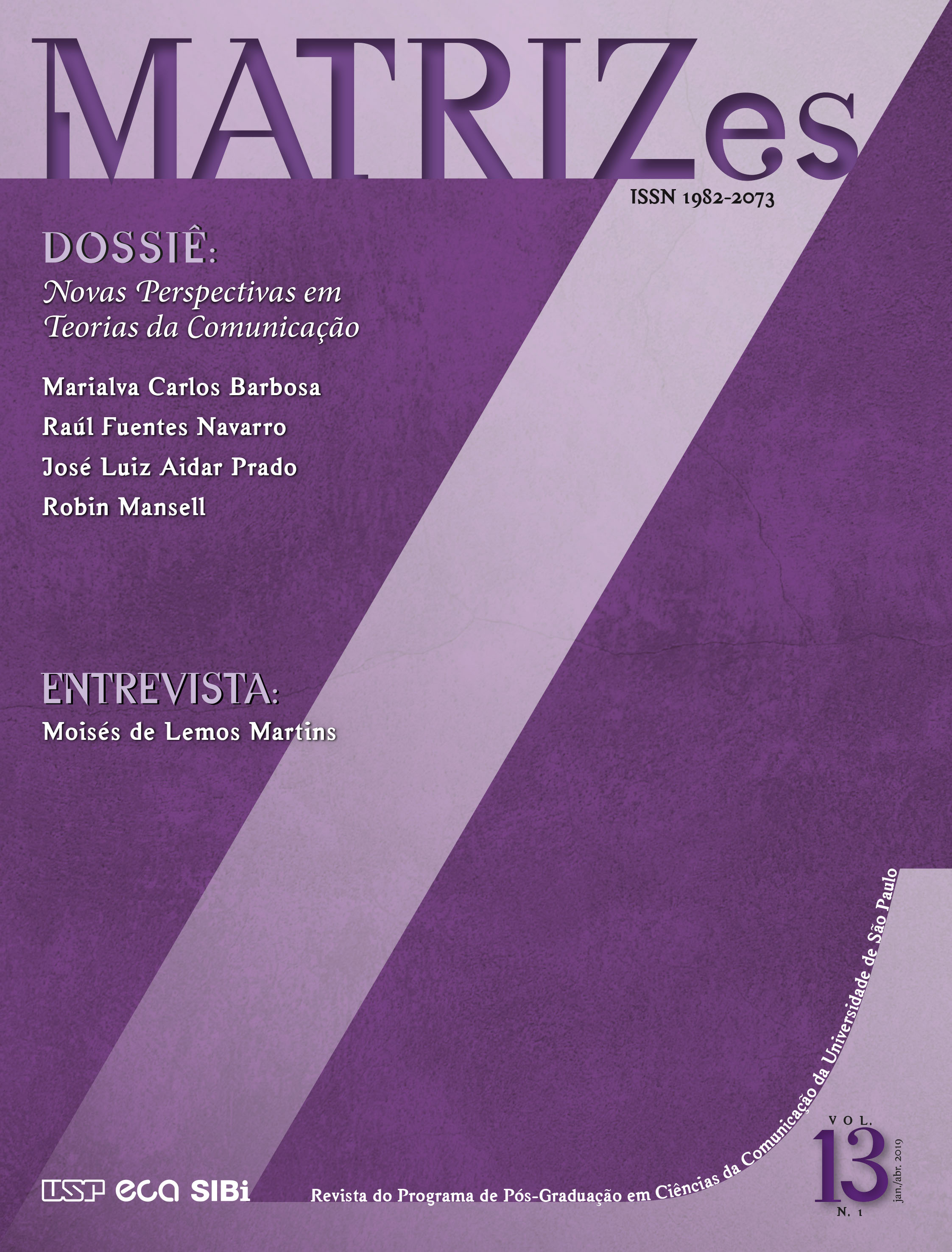Critique and recognition: the struggle for identity in media culture
DOI:
https://doi.org/10.11606/issn.1982-8160.v13i1p149-167Keywords:
Recognition, cultural criticism, collective identityAbstract
This article analyzes the controversial interactions about the film Vazante and the play Gisberta, in which identitary groups related to black and transsexual people, respectively, criticized the way they were represented in those fictions. From the theory of recognition by Axel Honneth, it aims to understand the emergence of those forms of social struggle in media culture. This study analyzes the collective semantics and the way it expresses the feelings of injustice related to the narratives. The struggle highlights different claims, which refer to both the cultural inclusion and the autonomy of fiction and propose relations between narrative and society that challenge the current media criticism.
Downloads
References
Amaral, B., Ionescu, M & Silveira, S. (Produtores) & Thomas, D. (Diretora). (2017). Vazante (filme). Brasil e Portugal: Globo Filmes.
Araújo, J. Z. (Produtor e Diretor). (2000). A negação do Brasil (filme). Brasil: Casa de Criação.
Amossy, R. (2007). Apologia da polêmica. São Paulo: Editora Contexto.
Bosco, F. (2017). A vítima tem sempre razão? São Paulo: Todavia.
Butler, J. (2017). Quadros de guerra (3a ed.). Rio de Janeiro: Civilização Brasileira.
Couto, J. G. (2017, 10 nov.) O inferno é aqui [Postagem de blog]. Recuperado de https://blogdoims.com.br/o-inferno-e-aqui/
Dunker, C. (2017). Subjetividade em tempos de pós-verdade (pp. 11-41). In C. Dunker, V. Safatle, C. Tezza, J. Fuks & M. Tiburi. Ética e pós-verdade. Porto Alegre: Dublinense, 2017.
Dyer, R. (2002). Only entertainment (2a ed.). Londres, Nova Iorque: Routledge.
Fraser, N. (2003). Social justice in the age of identity politics: redistribution, recognition, and participation (pp. 7-109). In N. Fraser & H. Honneth, A. Redistribution or recognition? A political-philosophical exchange. Londres: Verso, 2003.
Globo filmes (2017, 9 nov.). Vazante. Recuperado de http://globofilmes.globo.com/filme/vazante
Goes, T. (2018, 12 jan.). Quem acha que só ator trans pode fazer personagem trans não sabe o que é teatro. Folha de S.Paulo. 12 jan. 2018. Recuperado de https://bit.ly/2qZ1qS8
Gomes, J. [Juliano] (2017a, 18 set.). A fita branca. Revista Cinética. Recuperado de http://revistacinetica.com.br/nova/a-fita-branca/
Gomes, J. [Juliano] (2017b, 19 out.). O movimento branco [Postagem de blog]. Recuperado de http://piaui.folha.uol.com.br/o-movimento-branco/
Gomes, J. [Josué] & Caldeira, H. (2018, 7 jan.). Gisberta: o apagamento trans que se repete. Jornalistas Livres. Recuperado de https://jornalistaslivres.org/2018/01/gisberta-o-apagamento-trans-que-se-repete/
Gonçalves, A. M. (2017, 16 nov.). O que a polêmica sobre o filme “Vazante” nos ensina sobre fragilidade branca. The Intercept Brasil. Recuperado de https://bit.ly/2ATMN3g
Honneth, A. (2009). Luta por reconhecimento. São Paulo: Editora 34.
Lavigne, P., Arraes, G., Goulart, N. & Tomasi, L. (Produtores) & Furtado, J. (Diretor). (2004). Meu tio matou um cara (filme). Brasil: Natasha Filmes; Casa de Cinema.
Lobianco, L. (2018, dia mês). Esclarecimentos sobre o espetáculo Gisberta e os protestos em Belo Horizonte [Atualização de status do Facebook]. Recuperado de https://www.facebook.com/luis.lobianco/posts/10210323300267078
Lucon, N. (2018, dia mês). Artistas de BH fazem ato por representatividade trans nas artes e repudiam TransFake [Postagem de blog]. Recuperado de http://www.nlucon.com/2018/01/artistas-de-bh-fazem-ato-por.html
Miklos, M. (2018, dia mês). O crespúsculo do esquerdomacho. Quatro cino um: a revista dos livros. Recuperado de http://www.arevistadoslivros.com.br/conteudos/visualizar/O-crepusculo-do-esquerdomacho
Ramos, L. (2017). Na minha pele. Rio de Janeiro: Objetiva.
Rémi Grellety, R. & Peck, H. (Produtores) & Peck, R. (Diretor). (2016). Eu não sou seu negro (filme). Velvet Film: França, Estados Unidos, Bélgica e Suíça.
Ribeiro, D. (2017a, 20 dez.). O algoz não vai ter mais razão. Carta Capital, p. 37.
Ribeiro, D. (2017b) O que é lugar de fala? Belo Horizonte: Letramento.
Sá, X. (2017, 22 dez.). Treta é a palavra do ano no Brasil. El País. Recuperado de https://brasil.elpais.com/brasil/2017/12/22/opinion/1513962922_830606.html
Salabert, D. (2018, 8 jan.) Sobre a peça Gisberta, Luis Lobianco, Transfobia e CCBB [Atualização de status do Facebook]. Recuperado de https://bit.ly/2NrrBIO
Santos, Boaventura de Souza. (2016). A difícil democracia. São Paulo: Boitempo.
Silverstone, R. (2002). Complicity and collusion in the mediation of everyday life. New Literary History, 33(4), 76-780. doi: http://dx.doi.org/10.1353/nlh.2002.0045
Thomas, D. (2017, 4 out.). O lugar do silêncio [Postagem de blog]. Recuperado de http://piaui.folha.uol.com.br/o-lugar-do-silencio/
Downloads
Published
Issue
Section
License
Copyright (c) 2019 MATRIZes

This work is licensed under a Creative Commons Attribution-NonCommercial-ShareAlike 4.0 International License.
Authors who publish in this journal agree to the following terms:
- Authors retain the copyright and grant the journal the right to first publication, with the work simultaneously licensed under the Creative Commons Attribution License (CC BY-NC-SA 4.0) which allows sharing of the work with acknowledgment of authorship and initial publication in this journal for non-commercial purposes.
- Authors are authorized to assume additional contracts separately, for non-exclusive distribution of the version of the work published in this journal (eg, publishing in institutional repository or as a book chapter), with acknowledgment of authorship and initial publication in this journal.






















